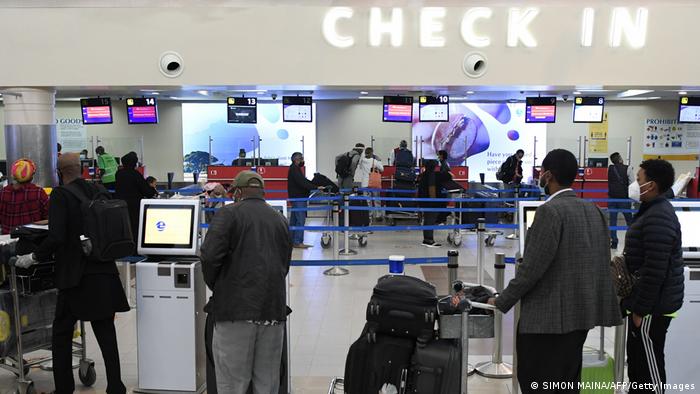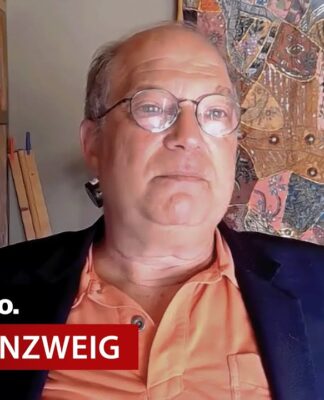BUSINESS
Stuck in a neocolonialist past: Is the migration brain drain an outdated concept?
The movement of highly skilled labor from developing countries to richer ones is largely seen as a negative trend. But voluntary migration is nuanced and complex.
Passengers line up for check-in at Jomo Kenyatta International Airport in Nairobi
Specialists leaving their home countries leave a gap — but it’s far more complex than that
There is only one cancer treatment center in all of Zambia, a country of nearly 20 million people. So for many there a cancer diagnosis also means racking up costs in travel to and from the Cancer Diseases Hospital in the capital Lusaka. That’s where my former schoolmate Dorothy Lombe worked as a radiation oncologist until summer 2021 when she left her job for a position in New Zealand.
“I’m not sure that my particular skill set would have been utilized anyway,” she tells me in a video call, “and that was one of my biggest drivers to move.”
“It wasn’t really to move away, but it was more to do what I love, which is radiation oncology,” she adds.
It’s the first time we are speaking in years, but I have been seeing Dorothy’s updates on social media. Her studies in medicine and oncology took her to Russia, South Africa and Canada. Unlike me and a few other schoolmates who left Zambia for university abroad, she has been back to work there. But it wasn’t easy, she tells me.
There were only three radiation therapy machines for the whole country, and only one was functioning. She was seeing as many as 60 patients a day.
Dorothy wanted to change that by launching Zambia’s first private cancer treatment center to help ease the burden on the public hospital. But she couldn’t follow through. Despite Zambia’s glaring need for more cancer treatment facilities, Dorothy could get neither the funds nor the support she needed.
Migration brain drain: a ‘neocolonialist flavor?’
Setting up a radiotherapy center in a country like Zambia requires an investment of around $6 million (€6 million), according to the Vienna Center for Disarmament and Non-Proliferation. The return on investment would have taken years, so Dorothy’s idea wasn’t convincing enough for investors. That contributed to her decision to leave Zambia.
A woman clad in medical overalls
Dorothy’s work in Zambia went beyond oncology, she had to help patients deal with socioeconomic problems
While the cancer burden is growing in lower- and middle-income economies, there were only 664 oncologists practicing in these countries in 2018. It wouldn’t be unusual to conclude that Dorothy should have remained in Zambia. Her departure led to the loss of a much needed health care worker.
But skilled workers shouldn’t be forced to stay, says economist and poverty researcher Johannes Haushofer.
“Wanting someone to stay where they are, even though they might want to migrate, is quite patronizing,” he says. “This worry about brain drain has a neocolonialist flavor to it … to want to keep people trapped in the places where they are, whether or not they want to leave.”
Haushofer is the founder of Malengo, a charity that facilitates international education migration from Uganda to Germany. The organization funds the first year of study at German universities for high-achieving low-income Ugandan students, who agree to pay back that money through an income share program upon graduation.
While the initiative aims to foster education for the students it neither expects nor encourages them to return to their home country.
“Migration may not just be good for the person who migrates but also for the people who stay behind,” Haushofer says.
Emigration creates opportunities beyond remittances
Remittances are often touted as the direct benefit for the families and countries of migrants. The Ugandan students sponsored by Malengo send an average of $165 a month back to their families, and that amount could rise with their earnings.
Graphic shows how the amount of remittances have increased for lower and middle income economies in the decade ending 2021, in addition to the top five countries for the absolute amount received and another five for the share of GDP
Skilled-worker migration can also encourage more investment in human capital, according to economist Haushofer. It shows others that studying can pay off and provide a path to professional development.
The Philippines is a good example when it comes to training nurses. Filipino migrants account for 4% of registered nurses in the US alone.
Zambia, where Dorothy and I went to school, has also been training more nurses as a result of the so-called brain drain of its health professionals — many of whom have gone to South Africa and the UK. Today, the southern African country is churning out more nursing graduates than can be employed by both Zambia’s public and private sectors.
More than 20,000 registered nurses were unemployed, according to one figure cited in a BBC radio document earlier this year. In March, the government pledged to hire more than 11,000 health workers. Still, the numbers clearly show that a Zambian nurse who leaves the country potentially creates an opportunity for someone else.
However, it’s worth noting that those who leave also tend to be more educated and experienced. It’s often professionals with a specialty. Individuals like Dorothy who have skills they can’t always use in the country.
Beyond a desire for a better salary and working conditions, they look for opportunities abroad where they can better thrive and grow in their professions. And that can be a good thing for their country.
The ‘brain drain’ return?
Working in another country doesn’t necessarily prevent emigrants from contributing to their countries’ economies beyond remittances.
“I’m definitely still involved in the Zambian health care system as far as I can be,” Dorothy tells me, “I’m very happy to mentor upcoming Zambians who are interested in research.”
And she’s already done that in the past. While on a medical fellowship in Canada, she helped organize a trip for her Zambian peers to get exposure to radiation oncology there. And Dorothy still wants to return to Zambia to work one day. So she believes she will one day use the skills she is gaining in New Zealand, especially if she can set up a cancer treatment center in Zambia.
That doesn’t come as a surprise to Haushofer.
“Many of the ones who migrate do it with a view towards coming back,” the economist tells me.
“And the training that they get abroad is often high quality training that then benefits the home country,” he adds.
Return migration, remittances and membership in global networks that enable trade, capital flows and knowledge diffusion to their countries are just some of the many benefits that skilled migrants can have for their countries, according to the World Bank.
So while an expert’s departure may very well create a gap, especially in the health sector, there are many other obvious benefits for the home countries of professionals who move abroad.
Digital transformation is also helping increase their potential to play a role in those economies. Remote work is also increasingly creating more opportunities for emigrants to contribute to their home country. And it also enables someone like Dorothy to mentor health professionals in Zambia or to link up with others, including diasporan Africans like myself.
While brain drain is conventionally understood to involve creation of a gap, some believe the term no longer describes the reality of voluntary migration. Critics of the term say new terminology is needed that reflects the complexity and nuance of the movement of skilled labor between countries.
Play Video3:04 min
Is Germany’s new ‘green card’ a real opportunity?
Edited by: Hardy Graupner
AUDIOS AND VIDEOS ON THE TOPIC
Why are African students moving abroad?
The mother of cancer-stricken children in Mombasa
Date 20.09.2022
Author Chiponda Chimbelu
Related Subjects Migration
Keywords brain drain, migration, remittances, Zambia, developing countries
Feedback: Send us your feedback.
Print Print this page
Permalink https://p.dw.com/p/4GySe

























